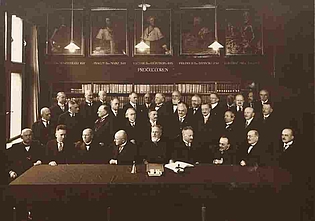Academy
The History of the German Academy of Sciences Leopoldina in the first half of the 20th Century
The research project examined the history of the Leopoldina during the period between the late 19th and early 20th century. Conceived as a “biography” of a scientific institution, the book, published in 2016, considers the social, political and historical context of the academy as well as the distinguishing characteristics of its development.
Special attention is paid to the specific role the Leopoldina has played in forming connections between different science academies, presenting in detail crucial differences as well as existing commonalities.
Using the Leopoldina as an example, the validity of the thesis set out in the historiography of the academy that there was a general loss of importance for the German academies during the first half of the 20th century is evaluated. The changing interrelationships between science, politics and the public at large, as well as the work of the academy in international, national, regional and urban settings, are explored in the light of the profound changes in the scientific landscape taking place around and after the year 1900. The focus of the study is the development of Leopoldina during the Weimar Republic, the National Socialist period, the Soviet occupation and the early GDR, as well as the role of the Leopoldina President Emil Abderhalden.
The project was initiated by the Leopoldina. Research was conducted by a working group led by Prof. Dr. Rüdiger vom Bruch at Humboldt University Berlin. Additional funding was provided by the Alfried Krupp von Bohlen und Halbach Foundation.
Project Manager
- Prof. Dr. Rüdiger vom Bruch
Department of History, Humboldt University of Berlin
Researchers
- Dr. Sybille Gerstengarbe
Leopoldina - Dr. Jens Thiel
Department of History, Humboldt University of Berlin - Simon Renkert M.A.
Department of History, Humboldt University of Berlin
Scientific Advisory Council
- Prof. Mitchell Ash, Institut für Geschichte der Universität Wien
- Prof. Wolfgang U. Eckart, Institut für Geschichte und Ethik der Medizin, Ruprechts-Karls-Universität Heidelberg
- Prof. Moritz Epple, Arbeitsgruppe Wissenschaftsgeschichte, Historisches Seminar der Johann-Wolfgang-Goethe-Universität Frankfurt am Main
- Prof. Jürgen Kocka, Internationales Graduiertenkolleg, „Arbeit und Lebenslauf“, Humboldt-Universität zu Berlin
- Prof. Brigitte Lohff, Institut für Geschichte, Ethik und Philosophie der Medizin, Medizinische Hochschule Hannover
- Prof. Volker Roelcke, Institut für Geschichte der Medizin, Justus-Liebig-Universität Gießen
- Prof. Margit Szöllösi-Janze, Historisches Seminar, Lehrstuhl für Neueste Geschichte und Zeitgeschichte, Ludwig-Maximilians-Universität München
- Prof. Helmuth Trischler, Museumsleitung Bereich Forschung, Deutsches Museum München
Projektleitung:
- Prof. Dr. Rüdiger vom Bruch, Institut für Geschichtswissenschaften, Humboldt-Universität Berlin
Projektbearbeitung:
- Dr. Sybille Gerstengarbe, Leopoldina
- Dr. Jens Thiel, Institut für Geschichtswissenschaften, Humboldt-Universität Berlin
- Simon Renkert M.A., Institut für Geschichtswissenschaften, Humboldt-Universität Berlin
Wissenschaftlicher Beirat:
- Prof. Mitchell Ash, Institut für Geschichte der Universität Wien, Prof. für Neuere Geschichte
- Prof. Wolfgang U. Eckart ML †, Institut für Geschichte und Ethik der Medizin, Ruprechts-Karls-Universität Heidelberg
- Prof. Moritz Epple ML, Arbeitsgruppe Wissenschaftsgeschichte, Historisches Seminar der Johann-Wolfgang-Goethe-Universität Frankfurt am Main
- Prof. Jürgen Kocka ML, Internationales Graduiertenkolleg, „Arbeit und Lebenslauf“, Humboldt-Universität zu Berlin
- Prof. Brigitte Lohff, Institut für Geschichte, Ethik und Philosophie der Medizin, Medizinische Hochschule Hannover
- Prof. Volker Roelcke ML, Institut für Geschichte der Medizin, Justus-Liebig-Universität Gießen
- Prof. Margit Szöllösi-Janze, Historisches Seminar, Lehrstuhl für Neueste Geschichte und Zeitgeschichte, Ludwig-Maximilians-Universität München
- Prof. Helmuth Trischler ML, Museumsleitung Bereich Forschung, Deutsches Museum München

